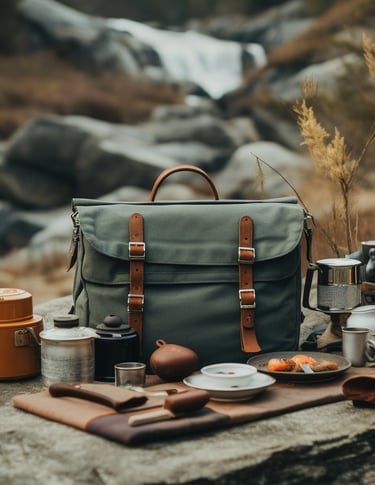The Ultimate Guide to Embracing the Nomadic Lifestyle
Traveling the world as a nomad is an exhilarating experience, but it requires careful planning and preparation. This guide will take you through the essential steps to embrace the nomadic lifestyle successfully.
3/3/20259 min read


How to be a Digital Nomad: Understanding the Nomadic Lifestyle
Training data only until October 2023. The nomadic lifestyle is a lifestyle characterized by a highly mobile existence. The foundation of this way of living is to engage with unfamiliar cultures and landscapes, moving away from the traditional notion of a permanent residence. There are many ways to be a nomad now, but two major types of nomadic life have emerged — digital nomads and adventure travelers.
Digital Nomads:
Digital nomads use technology to earn money remotely while traveling through diverse geographies. These are specifically what are called nomads, as they are nomadic workers who can essentially operate almost anywhere, including web developers, writers, graphic designers, etc. This lifestyle is incredibly appealing, as it offers the joy of travel and the responsibility of a professional career. Digital nomads are able to choose wherever they live according to personal preference, work, or even climate.
Adventure Travelers:
Adventure travelers, however, value the experience of exploration above work and meander from one place to another. Their travels tend to center around nature, outdoor pursuits, and adrenaline, like hiking, climbing, or surfing. This type of nomadism is more ad hoc and is usually dictated by a natural sense and urge of curiosity and adventure.
Despite being a phenomenal lifestyle approach that fosters personal growth, cultural understanding, and general awareness, the nomadic lifestyle is not without its challenges. Adjusting to new circumstances, overcoming language barriers, or navigating uncertainty can challenge one’s sense of resilience. In addition, constant change and lack of a stable home base can be emotionally isolating for some. Overall, the nomadic lifestyle is a unique and liberating way of seeing the world, but it demands a mindset that is open to new experiences, as well as a willingness to be flexible and self-reliant.
Why You Should Buy Travel Insurance
Planning is an integral part of becoming a nomad if you truly want your nomadic life to be meaningful. Choosing your destinations is essential before heading off on your journey. Researching your chosen places not only improves your travel experience but also helps you learn about the cultural nuances and best times to be present. Potential travel experiences can be narrowed down with considerations like climate, local celebrations, security, and more — determining areas that fit with your interests and goals to travel.
An important yet often overlooked aspect of planning not to miss is to understand visa requirements. Each country has its own entry requirements, and some may require a pre-arrival visa while others offer a visa on arrival facility. Getting to know these requirements well in advance of your departure can help prevent surprises, allowing for a smoother entry to your preferred destinations.
When thinking of a journey like nomadism, budgeting is just as important. Having a proper budget for your travel where you account for your accommodation, food, transportation, and the activities you want to do is important for not getting broke while traveling. Use budgeting apps to categorize expenses and modify your plans according to what you can afford, so you don't go into the red doing something you enjoy.
Secondly, travel insurance is always a good idea for any nomadic traveler. Travel insurance has got you covered for any unforeseeable events, such as a medical emergency or a canceled trip, therefore you can pay attention to your adventures rather than your liabilities! You may also want to select a policy that includes comprehensive coverage to meet your travel style.
Finally, planning out detailed itineraries will make the most of your time traveling. Integrate travel applications to simplify your organization process where you made reservations, prepare your transportation, and discover nearby sites. With loads of inspiration and ideas for your travels, these resources will take your planning and execution of your travels to the next level.
How to Pack Wisely for Nomadic Travel
Light yet effective packing is an essential lesson for all nomadic dwellers. The trick is to choose versatile clothing and essential gear, adapted to a range of climates and activities. When choosing your clothing, look for things that can be layered or mixed-and-matched so that you can create a multitude of outfits without taking up too much space in your bags. Therefore, I owe this suggestion is for light, quick-drying queen fabrics, because your travels need you to adapt to other environments while remaining comfortable every time during travel.
While clothing is one thing, the inclusion of gadgets is another, as they are essential for modern nomads. A smaller tablet or e-reader comes in handy for entertainment, reading materials, and note-taking without having to lug around books. A good power bank is also essential for this reason and will help keep your devices powered when there are no outlets available. A region-specific adapter helps make sure that you're using one that'll work in multiple regions as you travel, so you don't run into issues plugging in your gadgets.
When it comes to toiletries, the size of travel containers matters. Choosing a multi-use product, like a hybrid shampoo-body wash, can save space without losing the essentials of personal hygiene. Moreover, take into account climatic variables by bringing along items suited for varying weather conditions like lightweight rain jackets for humid climates or breathable fabrics for heat. Staying organized is essential — packing cubes or compression bags allow you to maximize space in your luggage, as well as effectively compartmentalize your items.
Packing wisely is an art that requires planning and an understanding of your needs as a nomadic traveler. Packing smart: your clothes, gadgets, toiletries; versatile styles, essentials road, ease of packing keeping you nimble for whatever defines your wandering infection.
Staying Connected on the Road
Keeping connected is a crucial aspect of the digital nomadic lifestyle. For frequent travelers, staying connected is essential: it allows them to keep up with family or friends, and access to work tools and websites is seamless. Digital nomads can stay connected while traveling the world with the help of various tools and technologies.
For one thing, mobile internet solutions have improved rapidly. There are dozens of providers that offer great plans for frequent travelers that won't break the bank either but will allow you to always stay connected, even when you're crossing borders. Pick a reliable internet source. Some portable Wi-Fi hotspots can offer pay-as-you-go options that are cheaper if you are not staying for an extended period of time, and you may also have the option to get a local SIM card depending on the region you are in. Doing independent research on the best mobile networks and plans can not only save time but money, too, and help nomads stay connected while on the move.
An important part of staying connected is knowing how to utilize available Wi-Fi. Many cafés, libraries, and co-working spaces offer free internet access, meaning digital nomads can work productively without missing the sights that made them travel to that destination in the first place. But nomads have to pay attention to cyber security risks of public Wi-Fi networks.
Moreover, there are many tools and platforms available for teamwork and communication in the digital nomads community. Services like Slack, Zoom, and Trello facilitate real-time communication and collaboration with coworkers, increasing efficiency while working from anywhere. Social media and messaging apps are other valuable tools that provide connections with family and friends to continue relationships while on the road, ensuring emotional support along the journey. If nomads learn how to utilize these resources properly, they can open up the doors to personal and professional opportunities throughout their travels.
Managing Finances as a Nomad
Having a good handle on finances is absolutely critical for a sustainable nomadic lifestyle. One of the early steps is to open international bank accounts, which can allow for access to funds across different countries. And plenty of banks and credit unions, of course, have travel-specific accounts with perks such as fewer fees for withdrawing money internationally and better exchange rates. Look for those accounts that are designed specifically for people who travel often or are digital nomads, this will help reduce transaction charges.
Major currency fluctuations have an impact on the value of the money you take abroad. Staying Current with Exchange Rates: For effective currency exchange, be sure to stay on top of current rates and consider using multi-currency accounts whenever you can. These accounts allow you to hold and transact in multiple currencies, so you can budget flexibly without excessive exchange fees. When converting currency, using online platforms with better rates can result in savings over time.
The art of budgeting on the road can be its own challenge. Budgeting for a nomadic lifestyle can help set expectations for spending. One pragmatic method is to dichotomize your expenses into essentials, like rent and food, and non-essentials, such as entertainment. Mobile applications make it easy to track spending, which can help ensure that you keep them from ruining your finances. It is also worth mentioning that an emergency fund should always be kept because unexpected costs can happen when in an unfamiliar place.
Many digital nomads pursue ways to earn money on the road. Those who freelance, work remotely, etc. As freelancers, we have the flexibility to work on projects that match our skills and availability. Various platforms help locate remote workers for employers: they provide a consistent source of income. Managing finances on the move can be complicated — but if you stick to the right strategies, it is possible and even livable to the nomadic lifestyle.
How to Build a Community While on the Road
While the nomadic lifestyle provides unique experiences and unbridled freedom, people must also find a sense of community on the road. Strengthening relationships and connections is the top priority of increasing the overall nomadic experience. Fortunately, there are plenty of ways to meet new people and make friends, even in a busy city or a quiet countryside.
Start going to local meetups — that is how to network with people. This can include arts and culture, professional events, outdoor activities — many cities and towns will have a whole range of events listed that cover a wide variety of categories and interests. Websites such as Meetup.com can help you find meetups catering to your interests, and it’s a great way to meet locals or other travelers. It is found that taking part in common activities might result in significant discussions and lifelong connections that improve the nomadic experience.
Social media helps them build a community too. Many platforms, such as Facebook, Instagram, and Meetup enable people to find events, participate in conversations, and meet like-minded people. There are so many more groups for travel topics, like the nomadic life on the road. They contain a ton of resources, tricks, and the chance to meet with like-minded adventurers. Aside from collecting valuable insights, leveraging social media also fosters relationships that will go beyond the digital landscape.
You can also meet spontaneous friendships with other travelers in hostels, coworking spaces, and cafes. Many great conversations happen spontaneously, just by continuing to chat naturally or joining in a more social activity together. During various activities, they develop camaraderie and share their tips and advice, making their social networks larger.
It is not just the ‘bad thing’ that is good for nurturing the nomadic lifestyle. When you build a community, you share experiences, you find emotional support, you build a sense of belonging, you make every journey not just exciting, but fulfilling.
Embracing Challenges and Staying Resilient
Being a nomad inherently comes with challenges that demand a certain level of resilience and adaptability. One of the most prevalent challenges that come with this kind of lifestyle is homesickness. Isolation, together with yearning for homogeneous environments, can be the name of the game, especially in an era dominated by family-oriented structures. Communicating with loved ones via video calls, either on apps or social media, can help combat homesickness. Setting up virtual routines, such as scheduled family chats, is a powerful way to fight that feeling of disconnection.
Cultural differences are also something nomads must learn to navigate, as no two destinations have the same set of customs, traditions, and social norms. Treading these differences can create misunderstandings and frustration. This can help increase cultural adaptability, which can be aided by researching the customs of the destination before you leave. Showing interest in local sentiments by attending community events or joining local workshops also helps to bridge cultural gaps, providing a better understanding and appreciation of different lifestyles.
Travel is notoriously unpredictable, but for the nomads, it adds an extra layer of complications. Flights can be delayed, accommodations and activities don’t always go as planned, and the weather isn’t always the best. But we can get a strong lesson on how to approach the unexpected by cultivating a flexible mindset. Nomads can embrace adaptability and challenges as opportunities for growth and turn what may present as a challenge into a fun experience. Furthermore, incorporating mindfulness practices like meditation and journaling into daily routines can help build mental resilience, enabling nomads to sustain a positive perspective in the face of uncertainty that their travels may present.




Contact us
Copyright © 2025. Ralnoscape All rights reserved.
Destinations
Resources


Follow us
This website uses affiliate links which may earn a commission at no additional cost to you
